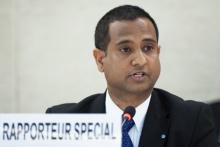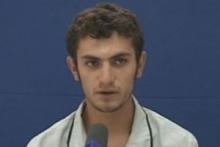
U.N. Special Rapporteur Ahmed Shaheed (United Nations)
(CNSNews.com) – The Islamic Republic of Iran’s use of “cruel, inhumane and degrading punishment persist[s] at alarming rates,” including a “surge in executions” over the past 14 months, said Dr. Ahmed Shaheed, special rapporteur to the United Nations Human Rights Council (HRC).
“Of particular alarm is the surge in executions documented this year,” Shaheed said in a statement accompanying his report to the HRC.
“At least 252 individuals were reportedly executed since the presentation of my last report to the Council; the highest total recorded in the past 12 years. This includes at least 753 executions in 2014, and 252 in the last 10 weeks, for a total of 1,005 executions” over the past 14 months, he said, including 25 women.
That’s a rate of more than two executions per day.
“A majority of these executions continue to be for crimes that do not meet international standards of ‘most serious”; and at least 13 juveniles were executed in 2014, in violation of international law,” the U.N official said.
“The Government [of Iran] continues to highlight its need to interdict drug-trafficking activities as justification for this alarming use of the death penalty…
“The fact remains, however, that executions for drug-related crimes, adultery, sodomy, alcohol consumption, and for vaguely worded national security offenses, such as corruption on earth, are illegal under international law,” Shaheed pointed out.
”Authorities should immediately nullify the death sentences against all political prisoners and prisoners of conscience, including that of Mr. Soheil Arabi and others, whose alleged actions do not constitute a serious crime under international law,” he recommended in his 55-page report.
In September 2014, the Supreme Court of Iran upheld the death sentence for Arabi, “a blogger convicted of sabb a-nabi (insulting the Islamic Prophet) for comments he allegedly posted on several Facebook accounts,” the U.N. report stated.
Arabi is still awaiting execution. More than a thousand other prisoners have been put to death in less than a year and a half, some in clear violation of international law.
(See UN human rights Iran.pdf)
“On or around 20 February 2015, Mr. Saman Naseem, a juvenile offender, was seemingly executed …for allegedly engaging in an armed conflict that led to the death of a member of Iran’s Revolutionary Guard,” the U.N. report noted.

Saman Naseem, a 22-year-old Kurdish man who was executed last year for taking part in an armed uprising when he was 17. (Nat’l. Council of Resistance of Iran)
The 22-year-old Kurdish man, who was 17 at the time he was arrested and convicted on charges of moharebeh (enmity with God) and efsad fel-arz (corruption on earth), was hanged at Iran’s Urmia prison last month despite an international ban on the execution of youths who were under 18 at the time of their offense.
Reyhaneth Jabbari was also hung on Oct. 25, 2014 for killing a former employee of Iran’s Ministry of Intelligence who she said tried to sexually assault her, raising the U.N.’s concerns about “due process and fair trial violations in the case.”
The Iranian regime also confirmed the execution of psychologist Mohsen Amir Aslani on Sept. 24, 2014 for “heresy,” “immoral acts,” and insulting the Prophet Jonah by implying that “it may have not been physically possible for Jonah to have been eaten by a whale and then to have escaped from the belly of that same whale, as certain religious traditions hold.”
The special rapporteur called for a “complete moratorium on the death penalty in Iran,” which he said would “better ensure protections for the right to life.”
The Islamic Republic of Iran, which characterized the special rapporteur’s report as “unfounded and baseless,” responded that under Iranian law, the death sentence can be imposed for “crimes that include large-scale trafficking of illegal drugs.”
Iran also denied that it is engaging in “arbitrary detention” of those who oppose the government. “No one has been arrested in the Islam[ic] Republic of Iran for exercising the right of peaceful assembly,” it claimed.
However, the U.N. report charged that hundreds of individuals, including lawyers, journalists and members of the clergy, have been detained in Iran for exercising their “internationally recognized rights.”
Shaheed cited reports of “arbitrary detentions, torture and ill-treatment of detainees,” “sub-standard detention conditions,” “inadequate access to “medical treatment in line with international standards” and a “lack of access to lawyers and fair trials.”
“Individuals including lawyers, journalists, religious and ethnic minorities who peacefully exercise internationally recognized rights are frequently convicted of national security offenses,” the report stated.
“At least 50 lawyers have reportedly been prosecuted since June 2009 for representing prisoners of conscience, in addition to political and ‘security’ prisoners,” the report added, “contributing to a climate that discourages lawyers” from defending them.
In one example, Kurdish human rights lawyer Masoud Shamsnejad was sentenced to four months in prison last October for “propagation against the system” after he represented several Kurdish political prisoners, the U.N. report pointed out.

Washington Post correspondent Jason Rezaian, who is imprisoned in Iran. (Twitter)
At least 30 journalists remained in detention as of December 2014, the report noted, including Washington Post correspondent Jason Rezaian, and the Iranian government blocks and filters websites, including Instagram, according to the U.N.
Prosecutors have been ordered to “monitor and summon anyone guilty of ‘overstating’ Government corruption,” the report added.
“The Government’s stated position is that it does not arrest journalists, lawyers or human rights activists for their activism per se, but rather for their commission of separate ‘national security crimes.’
“This logic…has led to the imprisonment of more journalists than almost any country in the world, often on charges which do not meet international requirements for limits on freedom of expression, like ‘propaganda against the system,’ and ‘insulting Government leaders’,” Shaheed said.
Religious minorities are also targeted, as well as Muslim converts, he added.
“As of 1 January 2015, at least 92 Christians remain in detention in the country allegedly due to their Christian faith and activities,” the U.N. report stated.
“In 2014 alone, 69 Christian converts were reportedly arrested and detained for at least 24 hours across Iran. Authorities reportedly continued to target the leaders of house churches, generally from Muslim backgrounds.”
Several Christian pastors are currently serving a six-year prison sentence for “acting against national security” and “establishing illegal groups with the intention to overthrow the government,” according to the report.
There are also an estimated 100 Bahai’s in detention. Discrimination against them is severe even in death, with some Iranian cities denying them access to cemeteries to bury their dead or restricting inscriptions on their tombstones to “first and last names, date of birth and death.” Bahai students are also blocked from enrolling in Iran’s universities.
The special rapporteur spoke with various Iranian officials in Geneva, as well as victims of the regime who are now in Germany, Norway and Denmark. He also interviewed 28 people “inside Iran and elsewhere” between July 2014 and January 2015 and reviewed government and media reports, confidential communications, draft legislation and reports by various human rights organizations.
The Iranian government would not allow Shaheed to visit the country.
Furthermore, the Iranian government responded to just five of 29 communications it received from the U.N. in 2014, including 27 “urgent actions addressing concerns regarding torture, arbitrary arrest and detention, persecution of religious minorities and reprisals against individuals for alleged contact with United Nations human rights officials,” the report stated.
That reduced Iran’s previous reply rate of 40 percent to just 17 percent last year.
“Willingness to admit that rights violations are occurring; resolve to examine laws or policies; and incremental steps to amend and/or rescind aspects of laws that violate national and international rights protections are necessary for progress,” Shaheed concluded.









